Marchés
Lors de la conception d’une intervention humanitaire et de la prise de décisions quant à l’utilisation des transferts monétaires, l’analyse générale des options de réponse doit inclure une analyse de marché. Il est prouvé qu’offrir un soutien ciblant le fonctionnement des marchés accélère la reprise et accroît la résilience dans les zones affectées par une catastrophe.
De nombreuses organisations ont investi dans la mise au point d’outils visant à faciliter l’analyse de marché et réfléchissent à la mise en place de programmes basés sur les marchés plus holistiques. Elles envisagent des interventions tirant profit du marché (basées notamment sur des transferts monétaires aux populations affectées), ainsi que des interventions soutenant directement les marchés (comme l’octroi de subventions conditionnelles aux vendeurs/euses pour la remise en condition du marché).
Initiatives associées
Contenu associé

1.2 Introduction à l’analyse de marché
Cours
Ce cours de 30 minutes offre une introduction à l’analyse de marché pour les contextes d’urgence. Il contient des contributions d'experts dans ce domaine. Ce cours a été développé en collaboration avec l'International Rescue Committee et le CALP Network et grâce au financement d’USAID/OFDA et de l’Agence Suisse pour le Développement et la Coopération. Il est destiné aux...

2.4 Un guide pratique pour l’analyse de marché
Cours
Ce cours en ligne de 3.5 heures vise à fournir aux équipes qui conduiront des analyses de marchés en contextes humanitaires une compréhension approfondie de la théorie et des étapes à suivre afin de leur permettre de comprendre le pourquoi et le comment du processus à suivre. Les participants seront guides à travers un scenario d'analyse de marchés d'urgence. Ce cours s'appuie sur...
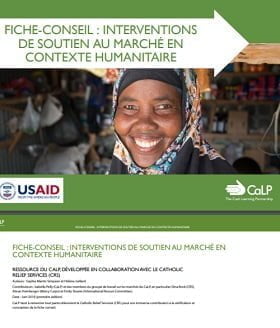
Fiche-Conseil : Interventions de soutien au marché en contexte humanitaire
Guides et outils
La fiche conseil définit le programme de soutien au marché en contexte humanitaire et le décrit dans la pratique. Elle permet aux praticiens humanitaires d’envisager systématiquement des interventions de soutien au marché, parallèlement à d’autres activités du programme. Le champ d’application comprend des interventions de soutien au marché axées sur l’offre/la disponibilité...
Thematic lead
Latest

Pintakasi. A review of shelter/Wash delivery methods in post-disaster or recovery interventions
Report
Catholic Relief Services conducted an in-depth study to assess the efficiency, effectiveness and appropriateness of the modalities for delivering shelter and Wash assistance in its Typhoon Haiyan Recovery Program. This study, Pintakasi hopes to contribute valuable lessons learned and share best...

Rapport Atelier Mobile Money
Rapport
Le réseau d’action et d’apprentissage sur les transferts électroniques (ELAN) a organisé deux ateliers sur le mobile money en janvier 2016 à Dakar (Sénégal) et à Gisenyi (Rwanda). 52 personnes venues de sept pays d’Afrique de l’Ouest et des Grands Lacs y ont participé...
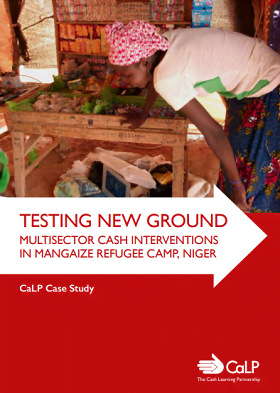
Testing new ground. Multisector cash interventions in Mangaize refugee camp Niger
Report
In the midst of the Mali refugee crisis in Niger, UNHCR implemented one of the first multisector cash transfer projects in Mangaize refugee camp in 2015, providing refugees with grants covering non-food items, hygiene, shelter and livelihood needs. The cash project came on the heels of a successful food...

Cash-based programming to address hunger in conflict-affected South Sudan: A case study
Report
For some time aid agencies and donors have recognised the benefits of utilising markets to deliver food assistance. And for almost as long, cash-based programming has been effective in doing this by improving people’s ability to purchase sufficient nutritious food. Addressing hunger through cash...

Outil d’évaluation des capacités organisationnelles
Guides et outils
De plus en plus d’organisations, de bailleurs de fonds et de gouvernements s’intéressent aux programmes intégrant des transferts monétaires dans les situations de crises humanitaires, à mesure que le nombre d’éléments prouvant leur impact augmente. Beaucoup d’organisations envisagent les...

The Politics of Cash: A Case Study on Humanitarian Cash Transfers in Ukraine
Report
This case study examines the evolution of cash transfers in the humanitarian response in Ukraine. The use of cash transfers in Ukraine brought out the best and worst aspects of the international humanitarian system. Uncertainty over where cash fits into the humanitarian architecture – and whether...
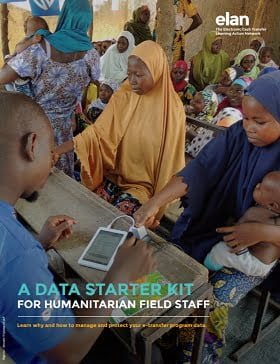
Data Starter Kit for Humanitarian Field Staff
Guidelines and Tools
A practical guide to help humanitarian field staff understand and manage data protection issues.

Data management and protection starter kit: Tip sheet 1: Privacy Impact Assessment (PIA)
Guidelines and Tools
A Privacy Impact Assessment (PIA) is a systematic analysis of the potential privacy risks related to data collected during program implementation. A PIA analyzes threats and risks to program data, including any legal and environmental factors, and develops mitigation strategies. PIAs help humanitarians...

Development of Training Modules on the Fundamental Concepts of Cash and Voucher Programming
Guidelines and Tools
The CALP Network is in its first year of a 5 year strategy. The first year has been marked by opening up the CALP Network’s membership to its wider community of practice, with a significant growth in membership expected in 2016,
the development of a Board of Directors, made up of up to 13...

DFID Shock-Responsive Social Protection Systems research: Literature review
Report
DFID has commissioned research into Shock-Responsive Social Protection systems, to further understand the nature of the interaction between social protection, humanitarian and disaster risk management systems and ways in which long-term social protection systems can be scaled up to
provide support in...
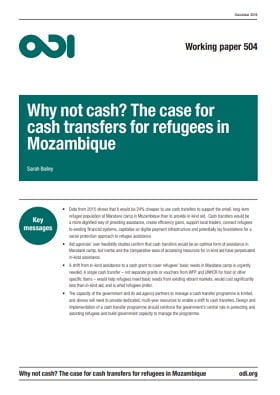
Why not cash? The case for cash transfers for refugees in Mozambique
Report
There are two areas where cash transfers could play a role in humanitarian assistance in Mozambique: in response to natural disasters and in support of the long-term refugee population. This working paper focuses on refugees. Why not cash? The case for cash transfers for refugees in Mozambique is one of a...

Food Security Cluster Coordinator Cash Transfer Briefing Package
Report
The gFSC aims to contribute actively to provide guidance and tools for national food security clusters to adequately coordinate cash interventions among cluster/sector partners and to ensure equally and consistently consideration of cash alongside other forms of humanitarian assistance in the food...

UNHCR Cash Assistance: Improving refugees lives and supporting local economies
Report
UNHCR’s Cash-Based Interventions (CBI) support the most vulnerable Syrian refugees living within the host community in Jordan. Thanks to generous donor support last year, over 30,000 households received monthly cash assistance, winterisation cash, and cash for health, totalling nearly US $ 85 million....

Terms of Reference Geneva-based Cash Working Group – January 2016
Report
Terms of Reference Geneva-based Cash Working Group – January 2016

Guide pour la protection dans le cadre des interventions monétaires
Guides et outils
Ce guide identifie les informations minimum nécessaires et les ressources clés visant à aider les professionnels de l’humanitaire à s’assurer que les risques et les bénéfices en matière de protection soient pris en compte et fassent l’objet d’un suivi tout au long du cycle d’un...

Scaling Up Humanitarian Cash Transfers in Nepal
Case Study
The Nepal earthquake has a number of lessons for the global debates on scaling up cash both at the level of cash responses themselves and in the more transformational way envisaged by the High Level Panel through which cash can disrupt the established humanitarian system. Humanitarian cash transfers after...

Research: Refugees Can Bolster a Region’s Economy
Report
The world’s refugee population has increased sharply in recent years, leading governments to argue over which countries should take in people displaced by war or other calamities. At the core of this debate is cost: refugees are usually considered an economic burden for the countries that take...
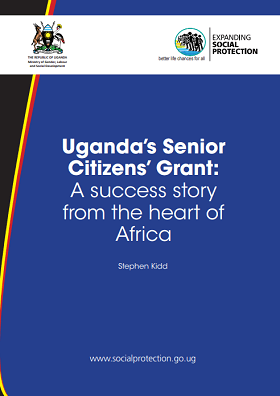
Uganda’s Senior Citizens’ Grant: A success story from the heart of Africa
Report
Since 2011, a pilot universal old age pension – known as the Senior Citizens’ Grant (SCG) – has been implemented in Uganda. By 2016, there were 125,000 beneficiaries. A number of studies have demonstrated that the scheme has had significant benefits. Despite the general economic situation worsening...
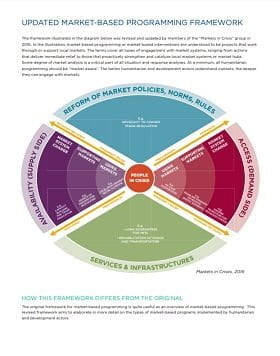
Updated Market-Based Programming Framework
Guidelines and Tools
The Market Based Programming framework was designed to help humanitarian actors understand market approaches in fragile contexts. Some degree of market analysis is a critical part of all situation and response analyses. At a minimum, all humanitarian programming should be “market aware”. The better...

Afghanistan Emergency Response Mechanism (ERM)
Report
The Afghanistan Emergency Response Mechanism (ERM) was selected as a case study to illustrate the ‘alliance’ form of inter-agency collaboration for sector-focused cash assistance, with semi-formal relationships and separate funding flows between members. It is distinctive from other cases in that cash...
